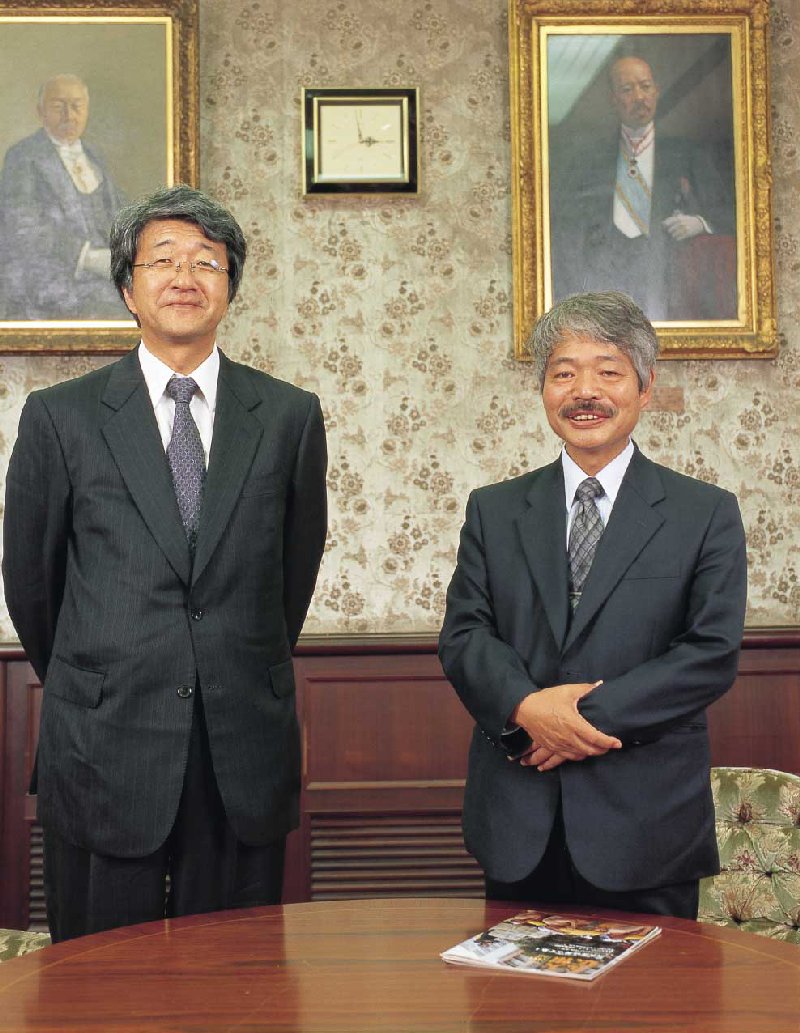
INTERVIEW
Dr.Tetsu Nakamura
Executive Director of Peshawar-kai* Medical Services(PMS). Born in Fukuoka in 1946.Graduated from Faculty of Medicine, Kyushu University in1973. Sent to Peshawar, Pakistan, by the Japan Overseas Christian Medical Cooperative Service (JOCS) in 1984. Currently engaged in medical and various other supportive services for people including Afghan refugees. Publications include "Peshawar nite (In Peshawar)."
*"kai" means "association."
| Interviewer: | Shin-ichi Ago (Left) |
| Professor, Faculty of Law |
Restoring a peaceful agricultural village life for the people of Afghanistan is a vital factor for the country's reconstruction. National reconstruction should take into account the different needs of each society. Peshawar-kai provides low price medical care in Pakistan and Afghanistan. Dr. Tetsu Nakamura, Executive Director of PMS, won the 2003 Ramon Magsaysay Award, which is known as Asia's equivalent of the Nobel Prize, for Peace and International Understanding.
The meaning of study is frequently questioned today. Kyushu University should be a place where we can pursue academia in its truest sense.
What is Peshawar-kai?
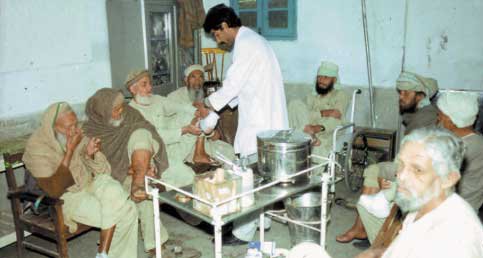 |
| This medical equipment was all the Hansen disease department of Peshawar Mission Hospital had in 1984. |
Nakamura: In 1978, I accompanied an expeditionary team from Fukuoka to Kashmir. Upon my arrival, I found people there to be very friendly and felt the place was comfortable for me. Then I heard the JOCS was recruiting a doctor for work in Peshawar, so I applied for the position.
Ago: What kind of activities were you involved in at the beginning?
Nakamura: Many local physicians and surgeons look for jobs there, and medical treatment is available as long as you can pay for it. I wanted to do what the local doctors could not do, so I started treating leprosy patients. The basic philosophy of our activities is that we provide services which are needed but which nobody has provided. In addition to offering medical services for leprosy patients as well as for people in medically underserved areas, we have recently addressed water supply issues, which include securing safe drinking water.
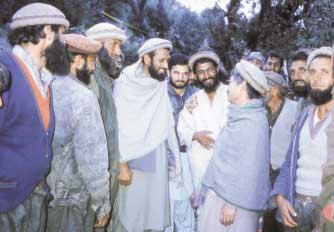 |
| Dr. Nakamura talking with local villagers during field work in a remote mountainous area in Afghanistan. |
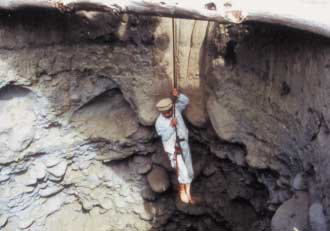 |
| Dr. Nakamura going down a PMS-dug irrigation well to check the work in Afghanistan. |
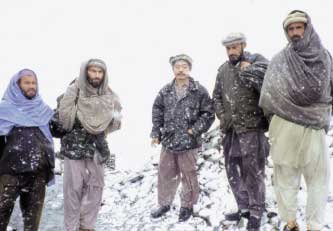 |
| Dr. Nakamura with local staff during field work in Afghanistan. |
Nakamura: That is an important point. International assistance is always centered on the places that attract people's attention. The problem is that people's attention is quickly diverted once a tragic event occurs in another place. This is why there is a deeply rooted mistrust among Afghans of international society. Another problem is the fact that the national reconstruction is led by foreigners. There is no point in bringing pencils to a country where people have no food for tomorrow. What we should do is to solve the food problem first, before criticizing the country's culture.
Ago: I had worked for the ILO (International Labour Organization) before I got a position at Kyushu University. I used to doubt whether the ILO staff members actually go to see the state of the country when they draft a plan for it.
Nakamura: The Afghan's economic views are different from our modern ones. Revitalizing agricultural industry is the key for rebuilding the country because Afghanistan has traditionally been an agricultural nation. The most important thing by far is for the Afghans to bring back a peaceful agricultural village life.
Ago: What is your opinion on the WFP's (World Food Program) food assistance to Afghanistan?
Nakamura: The WFP's food assistance has both its pros and cons. Each village in Afghanistan has been thoroughly self-sufficient and a village could survive even if the neighboring village declined. But continuing food assistance will ruin this principle of self-sufficiency. So food assistance should, in our opinion, only be provided in an emergency.
Ago: Then what do you think about the WFP assistance through the "Food-for-Work" project, under which workers are paid not with money but with food rations?
Nakamura: It may be a useful measure against unemployment. However, you should supervise the detailed work on the ground, otherwise effort may sometimes be wasted on unnecessary work - in some cases, wells are dug at unnecessary places. The important thing is to listen to the needs of the local community and to think from the perspective of the local people.
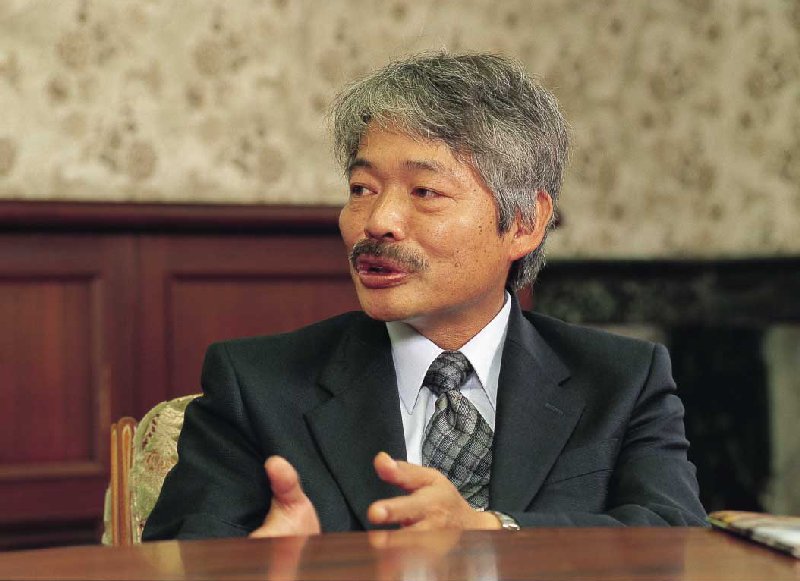
Memories of Kyushu University
Ago: Was it already your wish to contribute to society when you were a student at Kyushu University?
Nakamura: Yes. I always wanted to do something useful for society based on what I studied at the Faculty of Medicine.
Ago: Lastly, could you send a message to your juniors studying at Kyushu University?
Nakamura: Democracy was originally created to respect others. But recently, democracy is used to justify wars. In this critical situation, each of us is now faced with the question of how to live humanely. And especially because we are living in such a time, it is important to pursue the academic track with foresight. Kyushu University and its students have a social responsibility to pursue genuine academia.
Ago: That means we should study hard based on fundamental objectives as humans. We will aim to do our best. Thank you very much.
| Peshawar-kai (Non-Governmental Organization) Established in 1983 prior to when Dr. Tetsu Nakamura was dispatched to Peshawar, the capital city of the North West Frontier Province in Pakistan. Provides low price medical service at the PMS Hospital in Peshawar and clinics in remote mountainous areas in Pakistan and Afghanistan. Set up a medical aid project for Afghan refugees in 1986. In 2000, started a project to secure water sources as a measure against drought in Afghanistan. Currently offers low price medical service, treating about 160,000 patients per year both in Pakistan and in Afghanistan. No. of local staff: about 250; No. of Japanese staff: about 20 (in 2004). Has about 12,000 members in Japan, who assist the association's activities in Pakistan and Afghanistan with donations. |  |